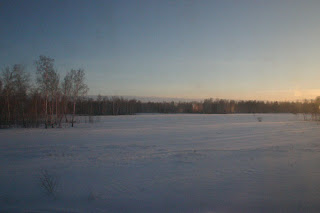Omsk - Krasnoyarsk
I awoke to find that we were deep in the fabled ‘House of
the Dead’. Siberia's reputation had its beginnings in the 17th century
when a formal system of exile was introduced. Often being exiled was the soft
part of the punishment, as beforehand you might have been flogged or mutilated,
like having the septum of your nose ripped out for illegally using snuff.
Following the Russian Revolution of 1917 a new system of exile took shape under
Stalin, (himself a former exile): the Gulag camp. These brutal forced labour
camps exploded in number during Stalin’s purges and drive to industrialise in
the 1930’s and 1940’s, and continued to exist until his death in 1953 when they
were slowly disbanded. Counter-revolutionary notables lived here and the town
on Tobolsk, founded in 1587, was once the capital of Siberia. Omsk has the dubious infamy of hosting both
Fyodor Dostoyevsky and Tsar Nicholas II during their exiles.
 |
| 831 miles approx |
kiosk. I bought these weird chocolate sponge things and some apple juice for tomorrow’s breakfast.
There were endless views of taiga as we headed over the
northern border of Kazakhstan, deep into Siberian territory on what is
apparently the world’s busiest stretch of freight railway.
It's impossible to read or concentrate on anything other than the views. Each of my neighbours stated the same; hour upon hour just disappeared as we were glued to the window. Boredom is the furthest thing from anyone's mind. This truly is heaven! 

Late night stop at Novobirsk, which is Siberia’s capital and
Russia’s third-biggest city by population. The city developed around the Ob
River Bridge, which was built for the Trans-Siberian railway. Coalfields to the
east and minerals to the north made this a key industrial and transport centre.
It also has a theatre which is bigger than Moscow’s Bolshoi. I didn’t see any
of this as I was tucked up under a blanket, eating weird chocolate sponges and
watching a film. It’s the only way to travel, don’t you know…













